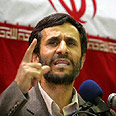
Iran's president-elect keeps hard line
Mahmoud Ahmadinejad, ex-Revolutionary Guard commander and Tehran mayor, says he will continue with 'peaceful' nuclear program, sees no urgent need for ties with U.S.
In a sign that Friday's surprise election result would cement decades of enmity between Tehran and Washington, Ahmadinejad and U.S. Defense Secretary Donald Rumsfeld traded negative remarks in their first comments since the vote.
But the ultra-conservative former mayor of Tehran said Iran would not abandon nuclear talks with the European Union although negotiations would be based on the Islamic Republic's "national interest."
Europe shares U.S. suspicions that Iran is seeking to build atomic weapons. Iran, the world's fourth largest oil exporter, insists the program is to meet soaring demand for electricity.
"We need this technology for energy and medical purposes. We shall carry on with it," Ahmadinejad said in his first news conference since beating moderate cleric Akbar Hashemi Rafsanjani.
Negative comments, EU freeze
Asked about talks between the European Union and Iran over its nuclear program, he said: "With preserving national interests and by emphasising the right of the Iranian nation for using peaceful nuclear technology, we will continue the talks."
European states - Britain, France and Germany - will list incentives that could be part of a deal to end Iran's uranium enrichment programme in late July or early August.
Prior to Ahmadinejad's news conference, the European commissioner Franco Frattini told Italy's La Repubblica daily that the EU would freeze dialogue with Iran if Iran's comments on nuclear or human rights issues were "negative."
The president of Iran has little power to change national policy in Iran's system of clerical rule, with the final word in matters of state lying with Supreme Leader Ayatollah Ali Khamenei. But analysts says the hardliner will influence policy.
Foreign Ministry spokesman Hamid Reza Asefi said over-arching nuclear policy was unlikely to change.
No need for ties with US
In campaigning, Ahmadinejad said Iran had an inalienable right to nuclear technology. Rival candidates advocated better ties with the United States, often dubbed the "Great Satan" In Iran, but Ahmadinejad said such ties were not a priority.
"Our nation is continuing the path of progress and on this path has no significant need for (relations with) the United States," Ahmadinejad told the news conference.
Rumsfeld said Ahmadinejad was "no friend of democracy" and would prove himself unacceptable to young Iran's young people and its women.
The 48-year-old Ahmadinejad, who earlier visited the shrine to Ayatollah Ruhollah Khomeini, the founder of the Islamic state, secured many votes from Iran's devout poor as he railed against rich cliques and promised to share out oil wealth.
His opponents fear Ahmadinejad's victory heralds a return to the purges and strictures of the early days after the 1979 Islamic revolution. As mayor, he has swept out old managers in municipal bodies and replaced them with young recruits.
Ahmadinejad, a former officer in the hardline Revolutionary Guard Corps and instructor in the Basij religious militia, has dismissed such worries as scaremongering by rivals and called for national unity.
"No extremism will be acceptable in popular government," He told the news conference, adding that his government would be one of "peace and moderation."
But he said he would fight corruption in Iran's oil and other sectors of the economy. Iran's conservative press hailed Ahmadinejad as a man who could take on the United States and uphold the moral principles
of the revolution.
Reformists blamed themselves for failing to implement reforms under outgoing President Mohammad Khatami. The conservative Kayhan newspaper wrote Ahmadinejad's win would scupper U.S. attempts to flex its muscles in the Middle East under what it called a smokescreen of spreading democracy.
"The recent election and the people's leaning towards a devout man ... Means America's plot of democratization in the region has backfired," wrote editor Hossein Shariatmadari.










